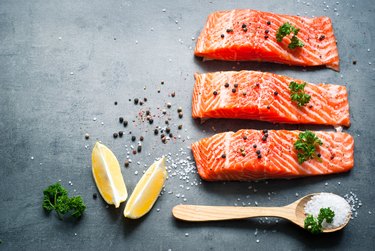
Blood type O can be a lifesaver. Type O negative is used for blood transfusions and the American Red Cross calls it the universal donor. But when it comes to the blood type diet, there's the O negative, O positive blood type diet meal plan.
O Positive Blood Type Diet
Video of the Day
If you have type O blood and you want to lose weight, dietitians recommend you eat healthy foods and get some exercise — just like people with every other blood type. The O positive blood type diet to lose weight came out in 1996 when Peter D'Adamo, a naturopathic physician, wrote Eat Right 4 Your Type.
Video of the Day
This book became a bestseller. D'Adamo went on to write more books and still touts diets tailored to individual blood types on his website. His website states, "Gut bacteria is related to blood type."
The problem is, there's no concrete evidence that it works. Harvard Health's Dr. Robert H. Shmerling, M.D., writes that, "We simply don't know which diet is best for each individual person. And even if we did, sticking to any single diet is often challenging."
Read more: O Positive Blood Type Diet Foods
Blood Type Diet Claims
Harvard Health's Shmerling says that "Eat Right 4 Your Type" recommends the following O positive blood type meal plan (also for those with O negative):
- Eat high protein foods — fish, meat, vegetables.
- Limit grains, beans and legumes.
To lose weight for O positive and O negative blood types, the diet recommends:
- Eating seafood, kelp, red meat, spinach and olive oil.
- Avoiding wheat, corn and dairy.
Blood Type Diet Studies
The American Journal of Clinical Nutrition reviewed the blood type diets in a May 2013 article. Here's what the authors found: "No evidence currently exists to validate the purported health benefits of blood type diets."
The authors did say that blood type, along with other factors, may be considered when developing a diet to lower cholesterol. But they found no health benefits came from sticking to the blood type diets.
They concluded, "Until the health effects of blood type diets have been substantiated, the widespread claims should be clarified so that consumers are aware that the advertised health benefits are theoretical and not supported by scientific evidence."
An article in the January 2014 journal PLOS One found that those who followed the type O diet lowered their triglycerides numbers. The authors concluded, however, that while the diet had some good effects on some cardiometabolic risk factors, this was independent of blood type. The findings didn't support the blood diet hypothesis, the authors said.
So, Does It Work?
The O positive blood type eating plan, along with the other blood type eating plans, may have some validity, Harvard Health's Shmerling says. "Eating based on your blood type requires you to know your blood type and then follow a restrictive diet," he writes.
The problem, he said, is likely to be eating what you prefer. Just because you have blood type O positive or O negative doesn't mean you want to eat a lot of meat or give up whole grains. The recommended supplements and organic foods aren't cheap, he said. Also, if you have health conditions, he said you're better off seeing a nutritionist who can make evidence-based recommendations.
Rather than eating a specific type of diet for your blood type, Liz Weinandy, a registered dietitian at Ohio State University's Wexner Medical Center, says the key to any diet is to make lifestyle changes that include good dietary choices. She suggests resolving to continue these good dietary changes, rather than following a fad diet for a few weeks, then going back to your old ways of eating.
Weinandy recommends people interested in the blood type diet look at the Mediterranean diet or the DASH (Dietary Approaches for Stopping Hypertension) diet. She writes, "These diets are road maps for healthy eating that include many plant-based foods, lean proteins and whole grains — all of which have been shown beneficial to human health."
- Harvard Health: "Diet Not Working? Maybe It's Not Your Type"
- Ohio State University Wexner Medical Center: "Should You Try the Blood Type Diet?"
- The American Journal of Clinical Nutrition: "Blood Type Diets Lack Supporting Evidence: A Systematic Review"
- PLOS One: "ABO Genotype, ‘Blood-Type’ Diet and Cardiometabolic Risk Factors"
- Dr. Peter J. D'Adamo: "Blood Type and Your Health"
- American Red Cross: "Why Is Type O Blood So Important"